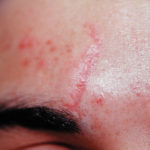
Once the redness sets into a scar, I have usually pre-explained that it will take up to 9 to 12 months to go away in adult and 15 to 18 months in children. While I always give this explanation based on my clinical experience, there have not been any scientific studies to my knowledge that have accurately shown how long scar redness persists.
In a February 2008 article in Plastic and Reconstructive Surgery, a study out of Manchester, UK has done exactly that. In a study of 103 patients who had incisional and excisional (cut out and closed) wounds made on their upper inner arms, photographs were used to determine the month during which redness faded for a particular scar. There results showed that scar redness faded at an average of 7 months after surgery. Scar redness faded faster in incisions but was slower in excisions. (wounds closer under tension) Many of these scars were still slightly red at 12 months.
Therefore, the historic statement of scar redness fading at one year after surgery is a good general statement. There are many variables, however, that effect how long a scar will stay red. These include body location (face incisions fade much quicker than on the body), orientation of the scar or incision to the relaxed skin tension lines of the surgical area, age and ethnicity of the patient, and how much tension has been placed on the closure. For these reasons, it is not possible with any degree of accuracy to predict for any one patient how long the scar redness will persist. But it is fair to say, it is almost never less than six months. Whether any of the various scar treatments hasten the resolution of redness has never been scientifically studied. However I suspect they may shorten it by a few months if used regularly after surgery.
If scar redness persists for more than a year after surgery, a scar revision may be needed for further improvement.
Dr Barry Eppley
Indianapolis, Indiana


